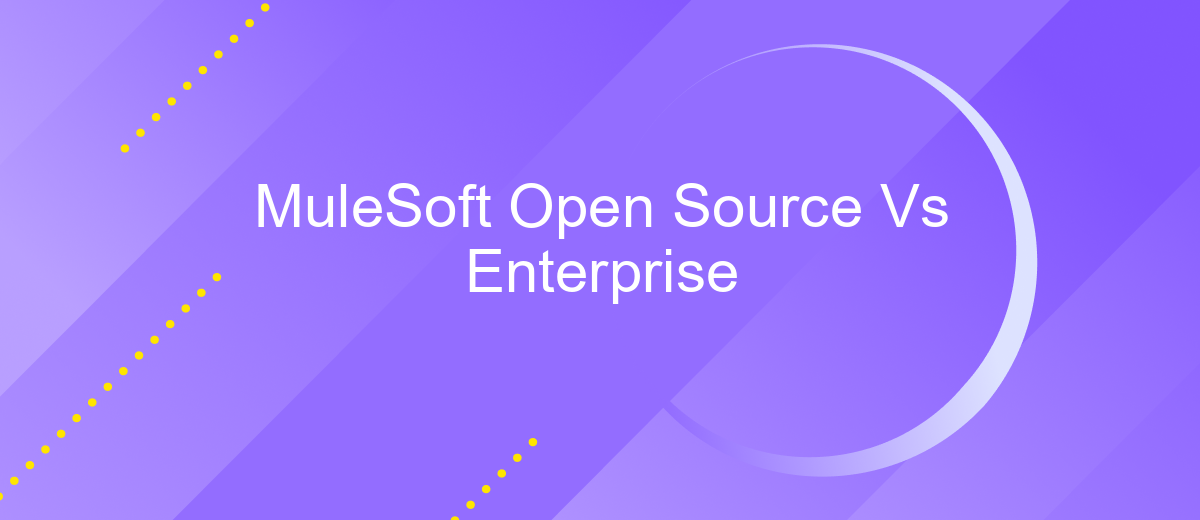MuleSoft Open Source Vs Enterprise
MuleSoft offers two distinct pathways for organizations looking to integrate their systems: the open-source Mule Community Edition and the Enterprise Edition. While the open-source version provides a cost-effective solution with basic features, the Enterprise Edition offers advanced capabilities, enhanced security, and dedicated support. This article explores the key differences between MuleSoft Open Source and Enterprise, helping you make an informed decision.
Introduction
In the realm of application integration, MuleSoft offers two distinct versions: Open Source and Enterprise. Both versions provide robust tools for connecting various systems, but they differ in terms of features, support, and scalability. Understanding these differences is crucial for organizations aiming to optimize their integration strategies.
- Open Source: Ideal for smaller projects or organizations with limited budgets, offering essential integration capabilities without the cost.
- Enterprise: Tailored for larger enterprises, providing advanced features, enhanced performance, and comprehensive support services.
Choosing between MuleSoft Open Source and Enterprise depends on your organization's specific needs, budget, and long-term goals. For those looking to streamline their integration processes, services like ApiX-Drive can complement MuleSoft by offering additional automation and integration solutions. By carefully evaluating the features and benefits of each version, organizations can make informed decisions that align with their operational objectives.
Key Differences

MuleSoft Open Source and MuleSoft Enterprise differ significantly in terms of features, support, and scalability. The open-source version, Mule Community Edition, offers basic integration capabilities suitable for small projects and individual developers. It lacks advanced features such as enterprise-grade security, monitoring, and management tools. On the other hand, MuleSoft Enterprise provides a robust set of tools designed for large-scale, mission-critical applications. It includes advanced security features, performance monitoring, and a comprehensive management console, making it ideal for businesses that require high reliability and scalability.
Another key difference lies in the level of support and services provided. MuleSoft Open Source relies on community support, which might not be sufficient for complex integration needs. In contrast, MuleSoft Enterprise offers professional support, including 24/7 customer service and access to expert consultants. Additionally, services like ApiX-Drive can help streamline the integration process by offering pre-built connectors and automated workflows, further enhancing the capabilities of MuleSoft Enterprise. This makes it a more viable option for enterprises looking to optimize their integration strategies efficiently.
Similarities

Both MuleSoft Open Source and Enterprise versions share several core features that make them powerful tools for integration. They both provide robust API management capabilities, allowing users to design, build, and manage APIs efficiently. Additionally, both versions support a wide range of connectors for seamless integration with various systems and applications.
- API management: Both versions offer strong tools for designing, building, and managing APIs.
- Connectors: A wide range of connectors are available for integrating with different systems.
- Data transformation: Both versions support data transformation and mapping functionalities.
- Integration patterns: Common integration patterns are available in both versions to streamline development.
- Security: Both versions include essential security features to protect data and integrations.
Moreover, services like ApiX-Drive can be utilized with both MuleSoft Open Source and Enterprise versions to further simplify and automate integration processes. This ensures that organizations, regardless of the version they choose, can achieve efficient and secure integrations tailored to their specific needs.
Use Cases

MuleSoft offers both open-source and enterprise solutions, each tailored to different use cases. Open-source MuleSoft is ideal for small to medium-sized businesses that require basic integration capabilities without the need for extensive support or advanced features. It allows developers to customize and extend functionalities as needed, making it a flexible option for those with technical expertise.
On the other hand, MuleSoft Enterprise is designed for larger organizations with complex integration needs. It provides a comprehensive suite of tools, including advanced security features, robust analytics, and dedicated support, ensuring seamless and secure integration across multiple systems. The enterprise version is particularly beneficial for companies that require high availability and performance.
- Small to medium-sized businesses: Open-source MuleSoft for basic integrations.
- Large enterprises: MuleSoft Enterprise for complex, secure integrations.
- Custom integrations: Open-source MuleSoft for flexibility and customization.
- Advanced analytics and support: MuleSoft Enterprise for robust monitoring and dedicated assistance.
For businesses looking to streamline their integration processes without extensive technical know-how, services like ApiX-Drive can be invaluable. ApiX-Drive offers a user-friendly platform for automating data flows between various applications, making it an excellent complement to MuleSoft solutions.
Conclusion
In conclusion, the choice between MuleSoft Open Source and Enterprise largely depends on the specific needs and scale of your organization. MuleSoft Open Source offers a cost-effective and flexible solution for smaller projects or teams with the technical expertise to manage and customize integrations. It provides the foundational tools necessary for building and deploying APIs but may require additional effort for maintenance and scaling.
On the other hand, MuleSoft Enterprise provides a comprehensive suite of features, including advanced security, scalability, and support services, making it ideal for larger enterprises with complex integration needs. Services like ApiX-Drive can complement both MuleSoft Open Source and Enterprise by offering easy-to-use integration solutions, reducing the time and effort required to connect various applications and systems. Ultimately, evaluating your organization's requirements and resources will help determine the most suitable option for your integration strategy.
- Automate the work of an online store or landing
- Empower through integration
- Don't spend money on programmers and integrators
- Save time by automating routine tasks
FAQ
What is the primary difference between MuleSoft Open Source and MuleSoft Enterprise?
Can I use MuleSoft Open Source for enterprise-level projects?
Is there a cost associated with MuleSoft Open Source?
What kind of support is available for MuleSoft Open Source users?
Are there any tools available to help with the integration and automation of MuleSoft Open Source?
Strive to take your business to the next level, achieve your goals faster and more efficiently? Apix-Drive is your reliable assistant for these tasks. An online service and application connector will help you automate key business processes and get rid of the routine. You and your employees will free up time for important core tasks. Try Apix-Drive features for free to see the effectiveness of the online connector for yourself.


